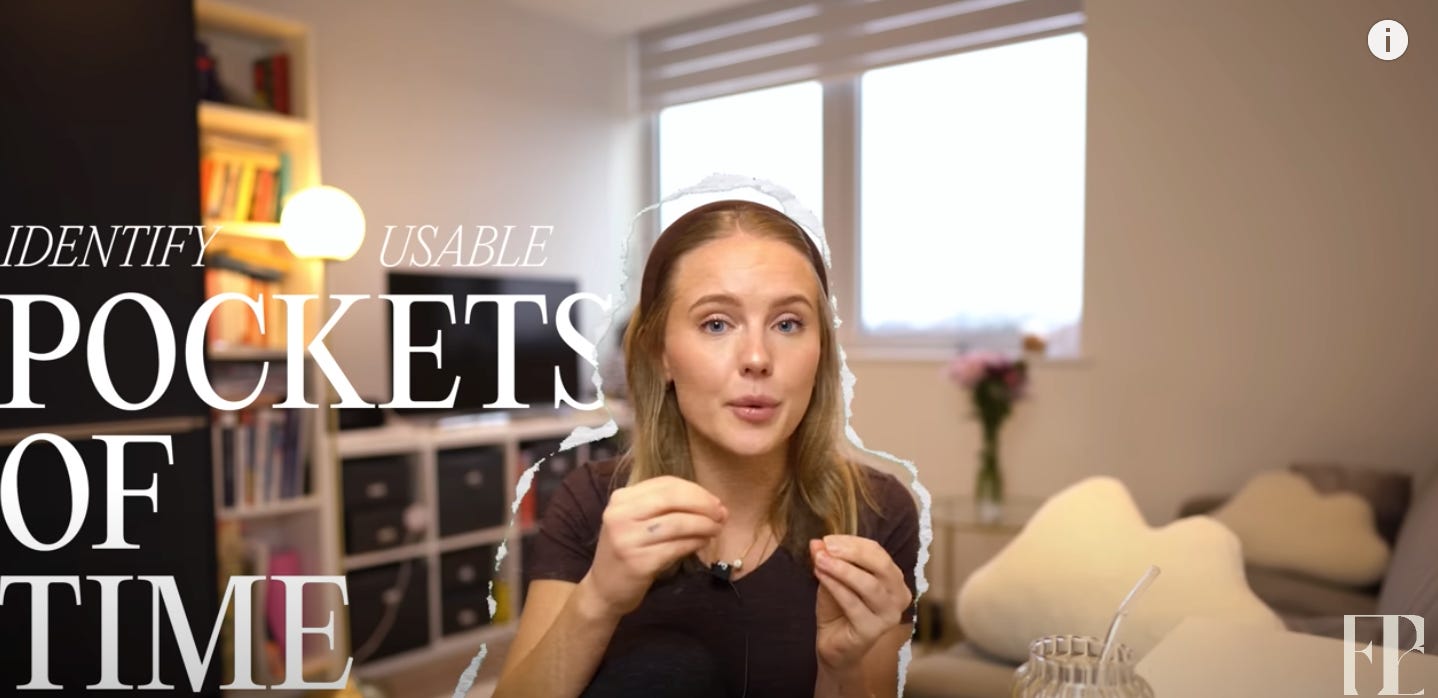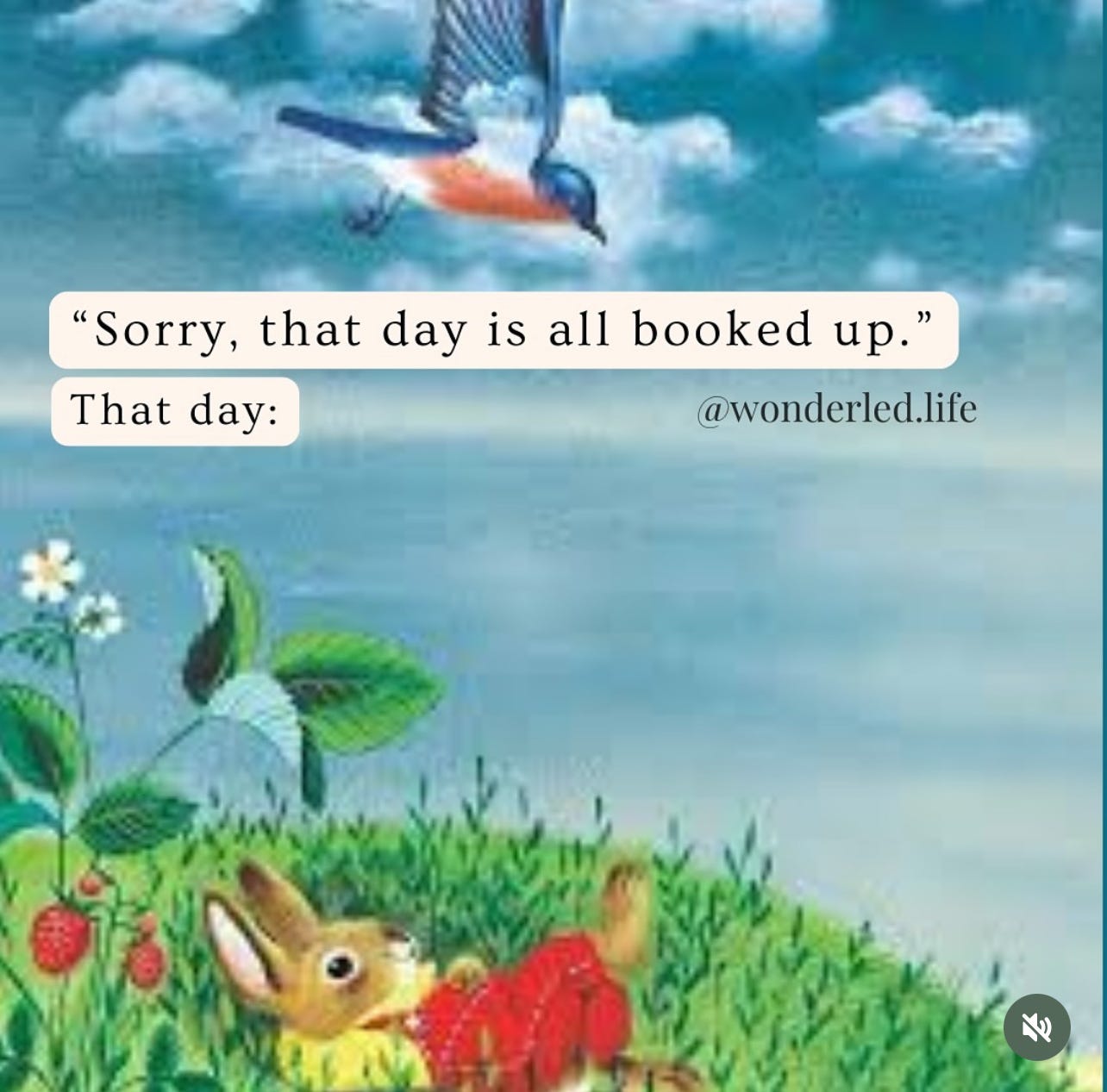The feminine urge to constantly optimise myself
Get in loser, we're escaping the gauntlet of late stage capitalism
brave enough is a newsletter about finding balance between technology, nature and modern life. Join the club ❤️🔥
Sometimes the silent, digital scream of my phone makes me want to pull a Serena van der Woodsen and throw it in a garbage can. I’m talking about the noise. That constant onslaught of information and advice, bubbling over like a neglected pot of pasta.
Don’t get me wrong, I love technology and I’m certainly no zealot. In fact, I’m fascinated with how our relationship with technology morphs as we navigate through this ever-growing ecosystem of digital life.
Being a woman has never been a walk in park and now we have the fresh hell of rapidly advancing technology to grapple with. I remember when social media was about being social. It was about sharing music and uploading 200+ photos into a single Facebook album entitled “clubbing 08.07.2013 xXx”. Now, it feels like every digital interaction is filled with people and companies who are a) trying to sell me something, b) trying to make me insecure about something so that they can sell me something, or c) giving me hot tips for how I can further refine my time management or my health or my carbon footprint. Sometimes I catch myself doomscrolling, breathing shallowly as the endless waterfall of information soaks my brain and soul. It doesn’t make me feel enlightened - rather, it gives me a weird, intellectual nauseousness that can be only be reversed by putting the phone or device away for a while.
A series of Instagram ads alerted me to a brand new condition recently. I stared at my phone screen, self-diagnosing myself. Little red bumps on your legs sometimes after shaving? Looks like a classic case of strawberry legs 🍓😱
This is apparently something that needs to be fixed urgently with either a silk leg scrubber or fancy serums. While I wasn’t hoodwinked by strawberry legs, what almost got me was the Hello Klean shower head. I live in Berlin, where the water is very hard compared to the UK and Ireland. I thought the only problem Germany’s calcium and magnesium-rich geology posed for me is the extra bit of elbow grease needed to clean my sink and shower, but allegedly hard water is ruining my hair and skin too.
Hello Klean target me relentlessly. I believe I am their exact ICP: 30-year-old female who doesn’t have kids or other important things to spend money on. They peddle water purifying shower heads for €78 a pop (for which you have to purchase refill cartridges that cost €36 every 3-5 months), along with shampoos and conditioners which “remove hard water residue while the micronutrient blend supports a hydrated skin barrier.” I actually considered buying this, despite not having any major hair or skin issues to report. The messaging got to me. Will my hair become brittle? What if I need to act now? What if it’s too late? These days a girl can sleepwalk into becoming a person who spends €184 a year on shower accessories she’s not even sure she needs in the first place. It’s important to have healthy skin and hair, but people have had healthy skin and hair for thousands of years without special shower heads. Smart marketing makes us feel like we need to purchase more to be healed, though I would argue that “healed” is as unreachable a destination as perfection.
Even if someone isn’t trying to part me with my money, I always feel bad about something. I’m not enough: not achieving enough, not travelling enough, not social enough, not informed enough. I must constantly enlighten myself on the dynamics of the US presidential elections, the plight of Palestine and Ukraine, every acre of the Amazon that is culled away, the declining numbers of wild bees, Chappell Roan’s album reviews and her performance with Olivia Rodrigo. I must be informed because if someone asks me about it and I don’t know, then shame on me for not keeping up. All of this information is at our fingertips, but we forget that we’re touching a pool of quicksand.
To be clear, my take here isn’t: “ignore everything going on in the world and just focus on yourself.” As the reel above so beautifully encapsulates, this overload of information has resulted in a kind of anxiety-fuelled paralysis. We’ve invested so much in this digital realm where the only life force is what others are doing and not doing, and what you are doing and not doing in comparison. Every passing year, we become further estranged from what is happening outside the algorithm-controlled echo chambers we occupy. I’m talking about touching grass, noticing the subtle changes in nature, and having the time to be truly bored - as humans were born to be.
Technology built with the intention support us has resulted in the push for everything to be optimised, calibrated, scheduled, measured and analysed. Every single moment of the day needs to be accounted for. We can be spontaneous, but only on Saturday, the day we pre-planned to hang out several weeks earlier. When I want to see a film in the cinema, it takes an average of four to six weeks to wrangle a date with my friend group. Everything feels administrative, when in reality life should have a great deal of unstructured time for play and contemplation.
This week, YouTube recommended me a video entitled “How I make Time for *EVERYTHING* (even with a full time job) | 5 Secrets of Time Management”. Save 20+ hours A WEEK, the thumbnail boldly claims. I get served this kind of content all the time despite never searching anything related to this topic. As I was already planning this post, I watched it for research purposes. The advice in the video was predictable and exhausting. This YouTuber seems like a really cool and ambitious person, but I start to zone out whenever anyone talks about planning 15 minute self-optimisation or productivity slots layered on top of other tasks. Sorry, but I don’t want to reply to emails and read flashcards while I’m on the stairmaster at the gym.
That’s capitalism’s trap: when not working, we need to be working on ourselves. Listen to podcasts while doing the dishes, use Blinkist to read a whole book on your commute, wear wrist weights while shopping for groceries to tone your arms. My Apple watch pulses gently on my arm, reminding me to stand up or go on a brisk five minute walk to hit my activity target for the day. It looks and feels so benevolent, helpful even, but it’s not about my wellbeing: it’s just one micro interaction in thousands, designed to deepen my usage of Apple’s vast collection of products. There’s a snakeoil like quality to all of these behaviours: none of this is making us happier, healthier, or more productive. Statistically, it’s having the opposite effect.
“Have you read Atomic Habits?” It feels like someone is always asking this. Of course I have read Atomic Habits, I’m a 30 year old young professional™. The book contains some helpful tips, but putting advice from the book into practice made me feel like a lab rat. Make it rewarding, the book claims. Give yourself a little piece of cheese for doing something different, until your rat brain learns to do the new behaviour autonomously. I imagine trying to explain this book to an ancestor of mine, who worked hard with their hands and then probably sat down for the rest of the day doing nothing and went to sleep when it’s dark. I don’t think any the civilisations that came before us were so obsessed with building habits, time management and self-optimisation. There are many things that matter in life and having responsibility and discipline is a good thing. Taking care of your mental and physical health, nurturing your relationships, pursuing meaningful work, and trying to leave the earth a better place than when you left it all all good ways to spend your time. However, sometimes we get so caught up in this that we forget to enjoy the gorgeous and psychedelic experience that is simply being alive.
Here’s a (very dark, sorry) way to reframe your thinking: what if you were diagnosed with a terminal illness tomorrow? When I put myself in that situation, I realise that many things I currently spend my days doing would instantly stop. Instead, I would spend as much time with my friends and family as possible, be in nature, and pursue my personal projects with tunnel vision. We all have responsibilities, but we have to be careful that work, hobbies and technology are enablers for living a fulfilled life. Otherwise, life can quickly mutate into a hamster wheel we can’t escape.
So how does one navigate this gauntlet? In my opinion, one of the most life changing books on this topic - and an absolute must read - is Digital Minimalism by Cal Newport. It teaches you to evaluate the tech you integrate into your life. Technology can be enriching, but only if you use it carefully. The problem is that we collectively subscribed to the idea that all of these apps and experiences are worth having for all the micro improvements they add. But the accumulation of all of these teeny tiny “benefits” creates the noise, which is probably one of the reasons why you find yourself compelled to click on a video that promises you can claw 20+ hours back a week.
Extending Newport’s framework slightly, I try and ask myself these questions regularly:
What truly matters to me in life? What makes me feel alive? How can I do this more regularly?
When is the last time I did nothing? I literally mean nothing. Not listening to music, not scrolling, not exercising. When I do nothing, what am I inspired to do on a soul level?
Why am I using [insert app/website/tool here]? What is the benefit? Do I really need this? Is this really the optimum way to achieve said benefit?
The example Newport uses is that people commonly state that they use Instagram to keep in touch with old friends. If your goal is staying in touch with old friends, then a (bi)monthly phone call is actually far more effective for staying in touch compared to the pseudo-social action of liking their photo carousels.
When I have an urge to do or buy something, who is behind this message/concept? Why are they selling this to me?
I think we would all be happier humans if we managed to shake off the shame we carry for not being the most productive, informed and beautiful creatures possible.












The title got me on this one. I am so incredibly drawn to self-improvement messaging — and it’s so incredibly detrimental to think that your self needs endless improvement and optimization. It really is “quicksand,” as you say. Enchanting article ✨
As someone who just recently gave in to purchasing wall Pilates after being hit over the head with its ads EVERY SINGLE DAY for the past year, I felt this. I try to resist the slimy marketing tactics, the urge to doomscroll, the need to know useless, fleeting internet trends (Brat summer? Demure and mindful? Do I really need to know this?), but the struggle is real. I’m not even 14, I’m 44!😭😂 Great essay! This is how we fight back.✊🏽